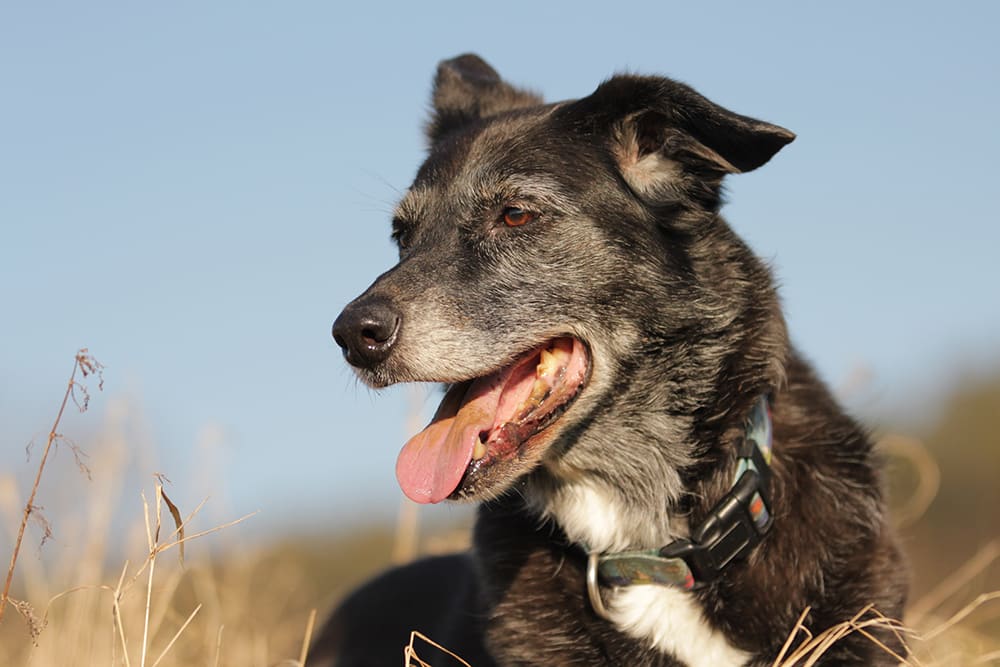If your dog has lost their enthusiasm for long walks, playing fetch, or jumping onto your bed, it could be a sign of osteoarthritis. Here, our Greensboro vets discuss osteoarthritis in dogs, its symptoms, causes, and how your dog's joint pain can be managed.
Osteoarthritis in Dogs
Osteoarthritis is a degenerative joint disorder that leads to a permanent deterioration of the cartilage that should be cushioning your dog's joints. This condition is also the most common form of arthritis seen in our beloved four-legged friends. It is estimated that osteoarthritis affects about a quarter of all dogs at some point throughout their lifetime.
Symptoms of Osteoarthritis in Dogs
The painful joints caused by osteoarthritis can lead to a number of tell-tale signs. Osteoarthritis symptoms in dogs can include any of the following:
- Pain, stiffness, and lameness
- Swollen joints
- Refusal to jump, use stairs, or run
- Reluctance to stand
- Restlessness
- Lack of enthusiasm for walks or play
- Unusual aggression, whining, or irritability
- Licking at joints
- Slow shuffling walk
Causes of Osteoarthritis in Dogs
Osteoarthritis can develop in dogs of any breed but is most often seen in larger breeds such as German Shepherds, Golden Retrievers, Labs, Rottweilers, and giant breed dogs such as Irish wolfhounds, Newfoundland dogs, and Great Danes.
While the actual cause of osteoarthritis is unknown this condition is often associated with underlying issues such as an injury due to trauma, hip dysplasia, elbow dysplasia, cruciate injury, or dislocations of the shoulder or knee.
Obesity also appears to play a role in the development of osteoarthritis in some dogs due to the excess stress on the dog's joints resulting in degenerative joint issues over time.
Osteoarthritis Treatments for Dogs
Osteoarthritis in dogs cannot be reversed or cured. Successful treatment of this condition is aimed at reducing your dog's pain and helping to slow the ongoing degeneration of the affected joints—allowing your dog to live more comfortably, and enjoy a good quality of life as they continue to age.
Veterinarians often recommend a multifaced approach to treating osteoarthritis in dogs that can include a combination of the following:
Pain Management Strategies
Painkillers such as anti-inflammatories are often prescribed as a long-term treatment for managing your dog’s joint pain and helping to reduce swelling. Cold laser therapy and acupuncture are also available to help calm inflammation and relieve pain.
Improve Joint Mobility With Exercise
While it may seem counterintuitive exercise is essential for dogs with osteoarthritis. It may be necessary to cut back on exercise when your dog is first diagnosed with osteoarthritis however staying mobile will help your dog to maintain fitness, achieve a healthy weight, relieve joint pain and enjoy a good quality of life.
The type and duration of exercises your dog participates in should be tailored to suit your pup's needs, overall health, and the severity of their osteoarthritis symptoms. Your vet will be sure to recommend the best level of exercise for your dog.
Reduce Inflammation Through Diet
Managing your dog's weight will be a key element of their treatment for osteoarthritis. Increased weight puts increased stress on your dog's joints so keeping weight at a healthy level will help to minimize the pain caused by the condition.
Your vet may recommend putting your dog on a calorie-reduced diet if their exercise level has been reduced, or a diet supplemented with chondroitin sulfate, glucosamine sulfate, and omega-3 fatty acids as a way to combat symptoms.
Physical Rehabilitation (Physiotherapy for Dogs)
Physical rehabilitation is physiotherapy for dogs and can include a number of treatments that are designed to help reduce pain while strengthening and improving muscle tone, maintaining range of motion, and working to improve overall endurance.
Physiotherapy for dogs with osteoarthritis may include one or more of the following treatments: therapeutic exercises, therapeutic ultrasound, cold laser therapy, regenerative therapy, neuromuscular electrical stimulation, underwater treadmill or pool therapy, and massage, combined with conventional treatments such as anti-inflammatory medications.
Ask your vet if there is a qualified Canine Physical Rehabilitation practitioner in your area
Surgery
In some cases, when joint damage is severe, your vet may recommend surgery to help alleviate symptoms and slow the progression of your dog's osteoarthritis. Surgery may be performed to remove bone fragments that are aggravating the condition or to replace the affected joints.
Prognosis for Dogs With Osteoarthritis
With the help of effective long-term pain management and a little extra love and attention, your dog may be able to enjoy a long and happy life. Speak to your vet to learn more about managing your pup's joint pain, and how you can help your dog to enjoy a pain-free active lifestyle for many years to come.
Note: The advice provided in this post is intended for informational purposes and does not constitute medical advice regarding pets. For an accurate diagnosis of your pet's condition, please make an appointment with your vet.
If your dog has lost their zest for life, our Greensboro vets are here to help! Contact Guilford-Jamestown Veterinary Hospital to book an examination for your canine companion.
Looking for a vet in Greensboro?
We're always accepting new patients, so contact our veterinary hospital today to book your pet's first appointment.
Related Articles View All
What happens during a routine pet exam?
Routine wellness exams are a proactive way to help safeguard your pet's long-term health and vitality. Why should you take your healthy pet to the vet? What happens during a pet health wellness exam? Find out.
How much does an emergency vet visit cost?
Emergency veterinary care can be costly, but planning ahead allows you to make decisions about your pet's care based on their needs rather than financial restrictions. Today, we look at the cost of emergency vet care, and how to be ready if your pet needs emergency treatment.
Kidney Failure in Dogs
Chronic and acute kidney failure are serious health problems commonly seen in dogs. Here, you will learn about the differences between chronic and acute kidney failure in dogs, the signs to watch for and how these conditions are treated.
Signs of Bladder Infections in Dogs & How They Are Treated
Many dogs suffer from bladder infections and other issues affecting the urinary tract system. What causes bladder infection in dogs? What signs should you watch for? How do vets treat bladder infections in dogs? Read on to find out.


